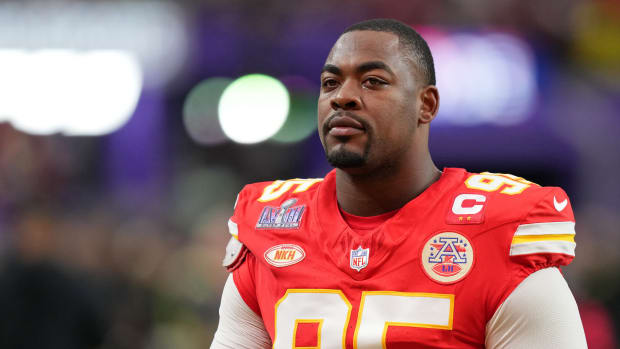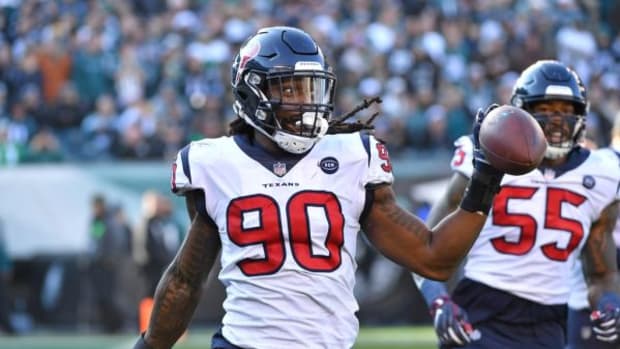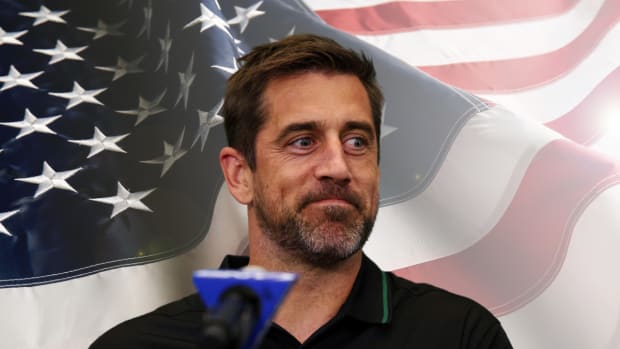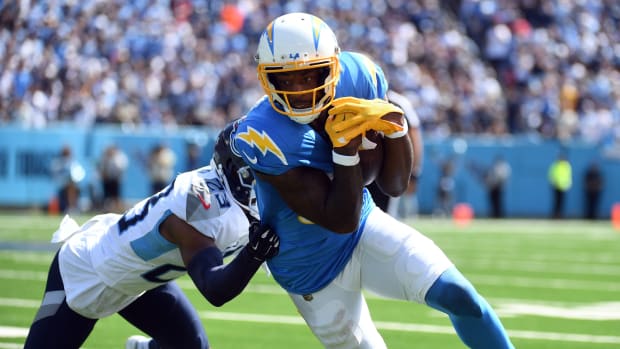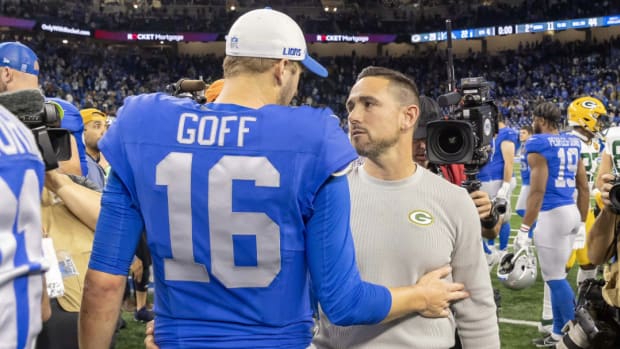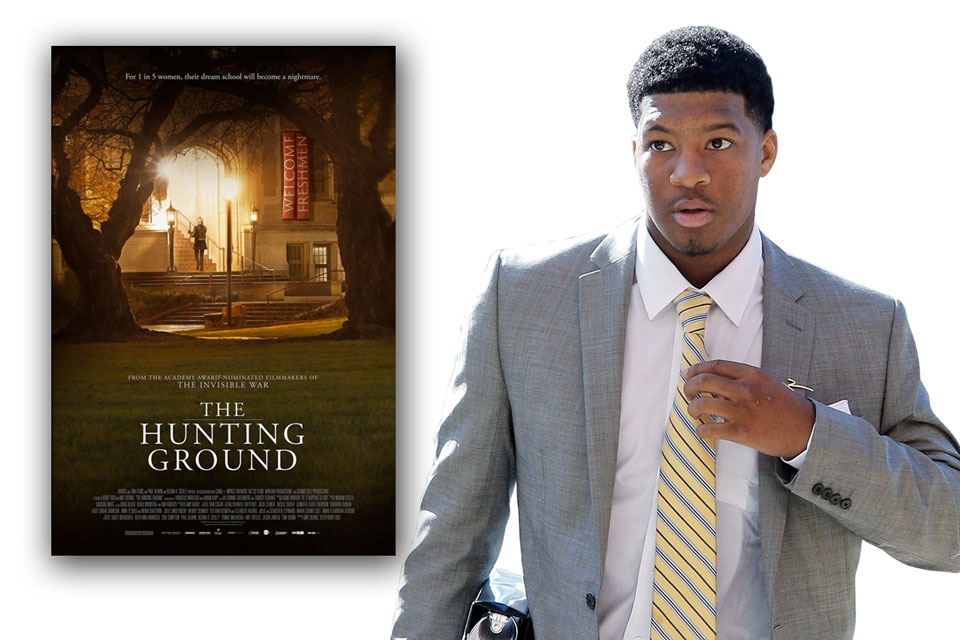
Director of ‘The Hunting Ground’: On Jameis Winston and His Accuser
The weeks leading up to the NFL draft are always rife with speculation. But this year that discussion has taken on a different tone, centering on how teams feel about the potential No. 1 overall pick, Heisman-winning quarterback Jameis Winston, off the field.
As NFL teams conduct their own investigations, the former Florida State student who accused Winston of raping her in Dec. 2012 publicly shared her side of the story in The Hunting Ground. The documentary film about rape on college campuses, which was released this spring, includes Erica Kinsman’s account of what happened the night she says Winston raped her, as well as her testimony that she had been told by a victim advocate at FSU that another woman had also come forward after an encounter with Winston. (After three investigations—by the police, the state attorney and Florida State’s hearing by a former Florida supreme court justice—the case against Winston, who says what happened with Kinsman was consensual, was not found strong enough for him to be charged or expelled. In response to Kinsman’s civil suit filed earlier this month, Winston’s lawyer issued a statement saying Winston welcomes the opportunity to clear his name with the truth).
The MMQB spoke to the director of The Hunting Ground, Kirby Dick, about giving a name and face to Winston’s accuser and what he thinks NFL teams can take away from his film. When asked why Winston should still be scrutinized after three separate investigations resulted in no chargers being brought, Dick echoed criticism of the Tallahassee Police Department (“It’s been clearly established through our reporting and by other publications that the Tallahassee Police Department’s investigation was indisputably flawed.”) and Florida State University (“similar cases [at other schools] with much less evidence have resulted in the accused being expelled”), adding:
“The most important reason we know Erica is credible is that when you sit down and speak with her one on one the overwhelming conclusion you come away with is that she is telling the truth. Which raises the question: Why haven’t the Tampa Bay Buccaneers reached out to her? They claim to have exhaustively investigated Winston and heard his side of the story, and yet they haven’t even taken the time to speak with Erica. Is it because they’re afraid they would realize that she’s telling the truth?” (A Buccaneers spokesperson said per team policy, they have consistently declined to go into specifics about the details of their research and whom they have contacted.)
More Football Conversations
Florida’s Dante Fowler on why he’s the draft’s top defensive playerJulius Thomas on hoops background and Jags futureNick Foles on leaving Philly, a new start in St. LouisJoe Banner on Chip Kelly’s overhaul of the EaglesClick here for our complete Talking Football series with Jenny Vrentas
JENNY VRENTAS: What was your goal in making this film?
KIRBY DICK: First, it was awareness. I don’t think this country is fully aware how poorly colleges and universities have handled the issue of sexual assault on their campuses. There is a tendency to give schools the benefit of the doubt, because most people rightfully feel proud of their alma mater. In fact, colleges and universities’ first response to a report of a sexual assault is very often to try to protect their own interests. We spoke to hundreds of survivors who reported a sexual assault whose school either mishandled the investigation or actively covered up the assault. This film is an opportunity for people to hear directly from these survivors, not only about their assaults but also about their school’s responses. This, I think, is a real eye-opener for people. When you read about a sexual assault in a newspaper article, the story can be somewhat abstract. But when you hear from these women and men who have gone through these experiences, it really helps shift your perspective on the issue as a whole.
JV: The film has the first public interview with Erica Kinsman, who accused Jameis Winston of sexual assault. Do you sense that putting a name and face to her for viewers has shifted public perception of Winston’s case?
KD: It definitely has; when the news broke of the case there was a rush to judgment on the part of many who assumed that Winston’s accuser was not credible because he was such a highly regarded football player. But that presumption is changing. We have heard over and over from people who’ve seen the film that hearing Erica speak about her experience has completely changed the way they look at it. Until the film came out, no one had heard Erica’s perspective.
JV: How did you approach her to be a part of the film?
KD: We became aware of this incident at the same time everyone else became aware, when the story broke in 2013. We reached out to the family soon after that and asked for an interview. But Erica is a very private person, and it took her quite a while before she decided to participate in the film. I think the reason she finally decided to come forward and be a part of the film was for the same reason so many of the other survivors in the film came forward: She did not want this to happen to another student. She wanted to be a part of the solution, and she knew that by speaking out it would help shift understanding of this issue around the country. Also, there has been so much discussion about her case, but no one had really directly heard her tell her own experience, and she wanted that to be heard as well.
JV: What part of her sharing her experience did you think was the most compelling?
KD: One very compelling part of her experience, that most of the public does not realize, is that there were two parts to the assault that Erica reported that night—she told police about being assaulted in Winston’s bedroom, and then, after a teammate interrupted them, he carried her into the bathroom, locked the door and attacked her again, more violently this time.
More Football Conversations
Scott Mitchell, former NFL QB and reality TV starRoman Oben, the NFL’s director of youth footballDan Quinn, head coach of the FalconsJoe Namath, MVP of Super Bowl IIIClick here for our complete Talking Football series with Jenny Vrentas
JV: One of the parts of the segment on Winston that stood out to me was when State Attorney Willie Meggs said, “I think I did not have sufficient evidence to prove that he sexually assaulted her against her will. I think things that happened there that night were not good.” What was your interpretation of what he meant by “not good”?
KD: We were told by both Meggs and his assistant DA, Georgia Cappleman, that they felt something traumatic happened between Winston and Erica that night, but they didn’t have enough evidence to charge him. Meggs said to us that if he’d been in charge of the investigation he would very likely have been able to find Winston and his teammates within 24 hours, rather than the months it took the Tallahassee Police Department, and could have very possibly gathered the evidence right away.
[A Tallahassee PD spokesperson declined via email to provide specific comment concerning criticism of their investigation. The TPD referred to past statements, including this one.]
JV: There seems to be an implication there that Meggs was troubled by Winston's actions that night. Is that how you interpreted it?
KD: Yes, absolutely.
JV: If NFL teams considering drafting Winston were to watch your film, what should their takeaway be?
KD: I’m not an NFL team owner, but if I were an NFL team owner, and I was considering drafting Jameis Winston, I would certainly watch this film and hear directly about the experience from Erica herself. One cannot presume to understand what happened just by reading about it in the press. It’s very, very important to listen to her assertion. I also think a team owner’s takeaway should be that this young woman who accused Winston of rape is very credible.
JV: Do you know if the film has been part of NFL teams’ research?
KD: We haven’t been contacted as part of a formal investigation by any team. But even though we haven’t been contacted, we hope the film will influence the NFL beyond the upcoming draft. Obviously, the Jameis Winston story is what we’re talking about today, but sexual assault is an issue on college campuses, with the NFL, and throughout society, and will continue to be so. We hope if and when team owners do see the film they will not only learn more about what happened that night, but also become better informed about the issue of sexual assault on college campuses and how it relates to athletes. No team owner wants their players to be involved in these kinds of assaults, and part of the way of addressing this problem to get information. And one excellent source of information is The Hunting Ground.
JV: Rolling Stone’s retraction of their University of Virginia story brought up the issue of false reporting. Although, on the whole, that is a small percentage of cases, what was your vetting process for cases included in the film, including Winston’s?
KD: We carefully vetted everything. We have thousands of pages of documents collectively on all the major stories we followed. The other difference between our film and the Rolling Stone piece is that everyone in our film who reported a sexual assault is identified and you hear from them directly as they describe their experiences. They are not anonymous as “Jackie” was in the Rolling Stone piece. We also reached out to the people accused in the major stories we profiled, and they either chose to not be interviewed for the film or didn’t respond at all. As far as Jameis Winston is concerned, we interviewed Erica multiple times, and found her consistent and credible every time. And we verified her story with independent witnesses, including witnesses that we found who investigators did not talk to. We also reached out to Winston’s attorney multiple times, we reached to the Tallahassee PD, we reached out to the detective there, Detective [Scott] Angulo, and we also reached out to FSU and asked them to comment.
JV: FSU issued a critical response to the film, calling it “seriously lacking in credibility” and saying that since no one from the university was interviewed, it was an “incomplete and erroneous” account of what the university did to investigate Kinsman’s allegations. Do you stand behind what you presented?
KD: We are very confident there are no flaws in our depiction of Erica’s story. Regarding FSU being interviewed, the facts are that we reached out to FSU and requested an interview and did not hear from them for two months. When we did, it was only days before the film was going to be released in theaters. Their statement that they didn’t have enough time to respond and do an interview is simply false.
[When asked for comment, a Florida State spokesperson referred to its previous statement and cited a letter of protest sent to the film’s production company, Radius-TWC, in February: “At no time did our President or University representatives affirmatively decline to be interviewed. In fact, we never had a reasonable opportunity to do so – and the filmmakers made sure we didn’t. Our President received a generic invitation from the filmmakers in mid-December, just as the university was closing for winter break. Our Vice President for University Communications called and left a voice mail. It was never returned.”]
More Football Conversations
Jerome Bettis, Hall of FamerThomas Davis, NFL’s Walter Payton Man of the YearAl Michaels, voice of Super Bowl XLIXSam Wyche, innovator of the no-huddle offenseDan Reeves, Ice Bowl alumClick here for our complete Talking Football series with Jenny Vrentas
JV: The film highlights many cases of sexual assault on college campuses, the majority of which are not related to athletes. Winston’s case is presented more than an hour into the film. Why did you think it was important to include his case?
KD: It is the most high-profile college athlete sexual assault case of perhaps the last decade. We knew we had to include it in the film because if we didn’t, audiences would have rightly criticized the film for not covering it. Of course we wanted to include the one voice that hadn’t been heard in all the coverage, and that was Erica Kinsman’s.
JV: What reactions have you received from including Winston’s case?
KD: The reaction to the film has been overwhelmingly positive. We’ve been told again and again by viewers that the segment with Erica Kinsman dramatically affected the way they saw the case. I think it’s also had a real impact on people’s understanding of the relationship between small-town police departments and major college football programs. The way Florida State responded is unfortunately not unusual. You see that again and again around the country with major athletic programs—they are rarely transparent about sexual assault investigations and frequently attempt (often successfully) to cover up reports of sexual assault.
JV: The film came out this spring, when Winston is in line to be a first-round draft pick. Have you found many viewers are watching the film for that reason?
KD: There’s obviously a certain part of the audience who follows sports closely and is going to be interested in the film for that reason, and that’s an audience we want to reach. It’s important that that audience be a part of this conversation as well.
I want to add that even though we focus on athletes in our film, it is only a portion of the problem, and we don’t want audiences to leave the film thinking this is a problem only in athletics. I think there’s a tendency in this country to believe that, because cases involving star athletes get so much coverage, that most sexual assaults in colleges are caused by athletes. That’s just not the case. Even though there’s a significant problem with sexual assault by some college athletes, I think athletics departments, coaches, and players have an opportunity to provide real leadership on this issue, and help move the country move toward a solution. College sports teams operate under a hierarchical system where the players look to the coach for leadership, and if the coach is providing leadership on sexual assault issues, he or she can exert an influence on all the players. In turn, the players are often looked up to by students on campus, so if players are providing leadership and promoting responsible behavior, that can positively influence the entire school. If this kind of leadership by athletes begins to happen on campuses across the country, it will influence the entire culture in a positive way.
JV: The role colleges play in handling sexual assault cases and ruling on discipline is not too different from what the NFL must do with its players. From making this film, what did you learn about the important factors in deciding discipline outside of a court of law?
KD: If a survivor chooses to go to the police we would support that, but there are challenges when going to the police. There are many wonderful police departments but there are also departments or individuals who have the same kind of victim-blaming mentality that you see throughout society. And even if a police investigation is done well, often prosecutors don’t want to take a case forward. It’s important to remember that just because charges aren’t pressed it doesn’t mean an assault hasn’t happened and it doesn’t mean that the accused is not a repeat offender who could assault again. So even if law enforcement doesn’t move forward with prosecution, it is the responsibility of the school to do its own investigation and make its own determination about whether there has been assault. If they fail to do so, they risk leaving an assailant on campus that could go out and assault again. NFL teams should take that same kind of approach. In the event that a prosecutor does not prosecute a player accused of sexual assault, the team should still conduct its own investigation and make its own determination as to what happened and what kind of sanctions it should issue. NFL teams, just like colleges, have an obligation to do everything they can ensure that sexual offenders are not part of their organization.
Follow The MMQB on Facebook, Twitter and Instagram.
[widget widget_name="SI Newsletter Widget”]














































